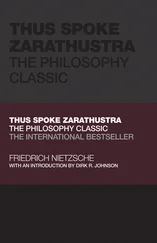In verses 28, 29, and 30 of the second portion of this discourse we meet with a doctrine which, at first sight, seems to be merely "le manoir a l'envers," indeed one English critic has actually said of Nietzsche, that "Thus Spake Zarathustra" is no more than a compendium of modern views and maxims turned upside down. Examining these heterodox pronouncements a little more closely, however, we may possibly perceive their truth. Regarding good and evil as purely relative values, it stands to reason that what may be bad or evil in a given man, relative to a certain environment, may actually be good if not highly virtuous in him relative to a certain other environment. If this hypothetical man represent the ascending line of life—that is to say, if he promise all that which is highest in a Graeco–Roman sense, then it is likely that he will be condemned as wicked if introduced into the society of men representing the opposite and descending line of life.
By depriving a man of his wickedness—more particularly nowadays— therefore, one may unwittingly be doing violence to the greatest in him. It may be an outrage against his wholeness, just as the lopping–off of a leg would be. Fortunately, the natural so–called "wickedness" of higher men has in a certain measure been able to resist this lopping process which successive slave–moralities have practised; but signs are not wanting which show that the noblest wickedness is fast vanishing from society—the wickedness of courage and determination—and that Nietzsche had good reasons for crying: "Ah, that (man's) baddest is so very small! Ah, that his best is so very small. What is good? To be brave is good! It is the good war which halloweth every cause!" (see also par. 5, "Higher Man").
Chapter LX. The Seven Seals.
This is a final paean which Zarathustra sings to Eternity and the marriage–ring of rings, the ring of the Eternal Recurrence.
…
PART IV.
In my opinion this part is Nietzsche's open avowal that all his philosophy, together with all his hopes, enthusiastic outbursts, blasphemies, prolixities, and obscurities, were merely so many gifts laid at the feet of higher men. He had no desire to save the world. What he wished to determine was: Who is to be master of the world? This is a very different thing. He came to save higher men;—to give them that freedom by which, alone, they can develop and reach their zenith (see Note on Chapter LIV., end). It has been argued, and with considerable force, that no such philosophy is required by higher men, that, as a matter of fact, higher men, by virtue of their constitutions always, do stand Beyond Good and Evil, and never allow anything to stand in the way of their complete growth. Nietzsche, however, was evidently not so confident about this. He would probably have argued that we only see the successful cases. Being a great man himself, he was well aware of the dangers threatening greatness in our age. In "Beyond Good and Evil" he writes: "There are few pains so grievous as to have seen, divined, or experienced how an exceptional man has missed his way and deteriorated…" He knew "from his painfullest recollections on what wretched obstacles promising developments of the highest rank have hitherto usually gone to pieces, broken down, sunk, and become contemptible." Now in Part IV. we shall find that his strongest temptation to descend to the feeling of "pity" for his contemporaries, is the "cry for help" which he hears from the lips of the higher men exposed to the dreadful danger of their modern environment.
Chapter LXI. The Honey Sacrifice.
In the fourteenth verse of this discourse Nietzsche defines the solemn duty he imposed upon himself: "Become what thou art." Surely the criticism which has been directed against this maxim must all fall to the ground when it is remembered, once and for all, that Nietzsche's teaching was never intended to be other than an esoteric one. "I am a law only for mine own," he says emphatically, "I am not a law for all." It is of the greatest importance to humanity that its highest individuals should be allowed to attain to their full development; for, only by means of its heroes can the human race be led forward step by step to higher and yet higher levels. "Become what thou art" applied to all, of course, becomes a vicious maxim; it is to be hoped, however, that we may learn in time that the same action performed by a given number of men, loses its identity precisely that same number of times.—"Quod licet Jovi, non licet bovi."
At the last eight verses many readers may be tempted to laugh. In England we almost always laugh when a man takes himself seriously at anything save sport. And there is of course no reason why the reader should not be hilarious.—A certain greatness is requisite, both in order to be sublime and to have reverence for the sublime. Nietzsche earnestly believed that the Zarathustra–kingdom—his dynasty of a thousand years—would one day come; if he had not believed it so earnestly, if every artist in fact had not believed so earnestly in his Hazar, whether of ten, fifteen, a hundred, or a thousand years, we should have lost all our higher men; they would have become pessimists, suicides, or merchants. If the minor poet and philosopher has made us shy of the prophetic seriousness which characterized an Isaiah or a Jeremiah, it is surely our loss and the minor poet's gain.
Chapter LXII. The Cry of Distress.
We now meet with Zarathustra in extraordinary circumstances. He is confronted with Schopenhauer and tempted by the old Soothsayer to commit the sin of pity. "I have come that I may seduce thee to thy last sin!" says the Soothsayer to Zarathustra. It will be remembered that in Schopenhauer's ethics, pity is elevated to the highest place among the virtues, and very consistently too, seeing that the Weltanschauung is a pessimistic one. Schopenhauer appeals to Nietzsche's deepest and strongest sentiment—his sympathy for higher men. "Why dost thou conceal thyself?" he cries. "It is THE HIGHER MAN that calleth for thee!" Zarathustra is almost overcome by the Soothsayer's pleading, as he had been once already in the past, but he resists him step by step. At length he can withstand him no longer, and, on the plea that the higher man is on his ground and therefore under his protection, Zarathustra departs in search of him, leaving Schopenhauer—a higher man in Nietzsche's opinion—in the cave as a guest.
Chapter LXIII. Talk with the Kings.
On his way Zarathustra meets two more higher men of his time; two kings cross his path. They are above the average modern type; for their instincts tell them what real ruling is, and they despise the mockery which they have been taught to call "Reigning." "We ARE NOT the first men," they say, "and have nevertheless to STAND FOR them: of this imposture have we at last become weary and disgusted." It is the kings who tell Zarathustra: "There is no sorer misfortune in all human destiny than when the mighty of the earth are not also the first men. There everything becometh false and distorted and monstrous." The kings are also asked by Zarathustra to accept the shelter of his cave, whereupon he proceeds on his way.
Chapter LXIV. The Leech.
Among the higher men whom Zarathustra wishes to save, is also the scientific specialist—the man who honestly and scrupulously pursues his investigations, as Darwin did, in one department of knowledge. "I love him who liveth in order to know, and seeketh to know in order that the Superman may hereafter live. Thus seeketh he his own down–going." "The spiritually conscientious one," he is called in this discourse. Zarathustra steps on him unawares, and the slave of science, bleeding from the violence he has done to himself by his self–imposed task, speaks proudly of his little sphere of knowledge—his little hand's breadth of ground on Zarathustra's territory, philosophy. "Where mine honesty ceaseth," says the true scientific specialist, "there am I blind and want also to be blind. Where I want to know, however, there want I also to be honest—namely, severe, rigorous, restricted, cruel, and inexorable." Zarathustra greatly respecting this man, invites him too to the cave, and then vanishes in answer to another cry for help.
Читать дальше











